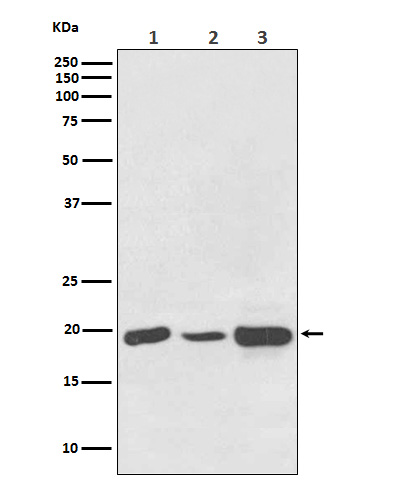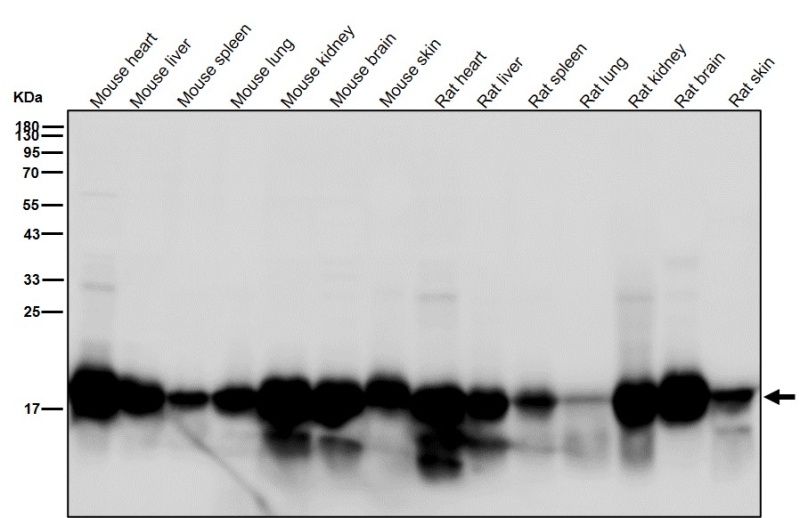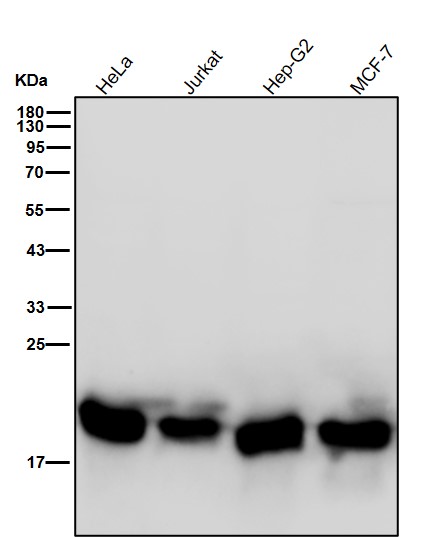


| WB | 咨询技术 | Human,Mouse,Rat |
| IF | 1/20-1/50 | Human,Mouse,Rat |
| IHC | IHC:1/100-1/200;IHF:1/50-1/200 | Human,Mouse,Rat |
| ICC | 1/50-1/200 | Human,Mouse,Rat |
| FCM | 1/20-1/100 | Human,Mouse,Rat |
| Elisa | 咨询技术 | Human,Mouse,Rat |
| Aliases | ASHI; CI-ASHI; NDUFB8;;NDUFB8 |
| WB Predicted band size | Calculated MW: 22 kDa ; Observed MW: 19 kDa |
| Host/Isotype | Rabbit IgG |
| Antibody Type | Primary antibody |
| Storage | Store at 4°C short term. Aliquot and store at -20°C long term. Avoid freeze/thaw cycles. |
| Species Reactivity | Human,Mouse,Rat |
| Immunogen | A synthesized peptide derived from human NDUFB8 |
| Formulation | Purified antibody in PBS with 0.05% sodium azide,0.05% BSA and 50% glycerol. |
+ +
以下是关于NDUFB8抗体的3篇参考文献,按文献名称、作者及摘要内容概括列出:
---
1. **文献名称**:*NDUFB8 Mutations Cause Mitochondrial Complex I Deficiency in Zebrafish*
**作者**:Vogel RO, et al.
**摘要**:该研究利用NDUFB8抗体通过Western blot和免疫组化技术,验证斑马鱼模型中复合物I亚基的表达缺失,揭示了NDUFB8基因突变导致线粒体呼吸链功能障碍的机制。
---
2. **文献名称**:*Targeting Mitochondrial Complex I Deficiency in Cancer Therapy*
**作者**:Calvani M, et al.
**摘要**:研究通过NDUFB8抗体检测多种肿瘤细胞系中线粒体复合物I的表达水平,发现NDUFB8低表达与化疗耐药性相关,并提出靶向复合物I的潜在治疗策略。
---
3. **文献名称**:*Mitochondrial Dysfunction in Alzheimer’s Disease: Role of NDUFB8*
**作者**:Fergusson G, et al.
**摘要**:使用NDUFB8抗体对阿尔茨海默病患者脑组织进行蛋白质分析,发现NDUFB8表达显著降低,表明其可能作为线粒体功能异常的生物标志物。
---
以上文献均明确在摘要或研究背景中提及NDUFB8抗体的应用,涵盖疾病模型、肿瘤治疗和神经退行性疾病领域。
NDUFB8 (NADH:ubiquinone oxidoreductase subunit B8) is a critical component of mitochondrial complex I, the largest enzyme in the electron transport chain responsible for oxidizing NADH and transferring electrons to ubiquinone. As part of the membrane arm of complex I, NDUFB8 plays a structural and functional role in maintaining the stability and activity of the complex, which is essential for ATP production through oxidative phosphorylation. Dysregulation of complex I, including NDUFB8 expression, has been linked to mitochondrial disorders, neurodegenerative diseases, and cancer, making it a focus of metabolic and disease-related research.
Antibodies targeting NDUFB8 are widely used in research to assess complex I assembly, expression levels, and mitochondrial function. They are critical tools for techniques like Western blotting, immunofluorescence, and immunohistochemistry to study mitochondrial health in conditions such as Parkinson’s disease, Leigh syndrome, or cancer metabolism. Specificity and validation of NDUFB8 antibodies are crucial due to the structural complexity of complex I and potential cross-reactivity with other subunits. Researchers often use these antibodies alongside markers of other mitochondrial complexes to evaluate respiratory chain deficiencies or to investigate the impact of genetic, pharmacological, or environmental perturbations on mitochondrial function.
×